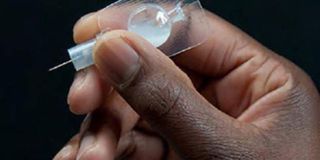The contraceptive set to make family planning easier

Health workers show what the birth cushions look like.
What you need to know:
The new contraceptive, known as Sayana press, is a three-month injection which uses a special device with a small needle and no traditional syringe.
Consistent use of family planning services has been one of the biggest challenges for many women of reproductive age.
But with a new easy-to-use contraceptive device, soon to be available to women in several developing countries, including Uganda, health experts believe this will change the trend.
This is after the Gates Foundation, drug company Pfizer and the Children’s Investment Fund Foundation signed a deal to make the contraceptive available to 69 developing countries, where the need for family planning remains high.
The new contraceptive, known as Sayana press, is a three-month injection which uses a special device with a small needle and no traditional syringe.
Previously, the technology has been used to administer hepatitis B jabs.
Sayana press is a reformulation of Pfizer’s depo-provera (medroxyprogesterone acetate), with the uniject injection system, which allows the contraceptive to be administered via an injection just under the skin. The uniject injection system is a small bubble of plastic, prefilled with a single dose and attached to a short needle.
“The use of this delivery system allows the contraceptive to be administered by health workers to women at home or in other convenient settings,” says a press statement from the Bill & Melinda Gates Foundation.
The numbers
More than 200 million women in developing countries want to delay pregnancy or prevent unwanted pregnancies but are not using any method of contraception.
Early this month, Family Planning 2020, released its second progress report, which revealed that in 2013, the number of women using modern contraceptives in the 69 target countries increased by 8.4m to 273m. The report estimates that overall modern contraceptive use in 2013 helped avert 77m unintended pregnancies and 125,000 maternal deaths.
In Uganda, contraceptive prevalence rate remains low at 30 per cent, while maternal mortality stands at 438 per 100,000 live births.
According to a 2009 study by the Guttmacher Institute, contraceptive use in Uganda can avert an estimated 490,000 unintended pregnancies and 150,000 induced abortions each year.
“When women are able to plan their families, they are more likely to survive pregnancy and childbirth, to have healthier newborns and children, and to invest more in their families’ health and wellbeing,” said Dr Chris Elias, president of global development programme at the Bill & Melinda Gates Foundation.
Uganda, Niger and Senegal are some of the countries that will soon introduce the new contraceptive.




